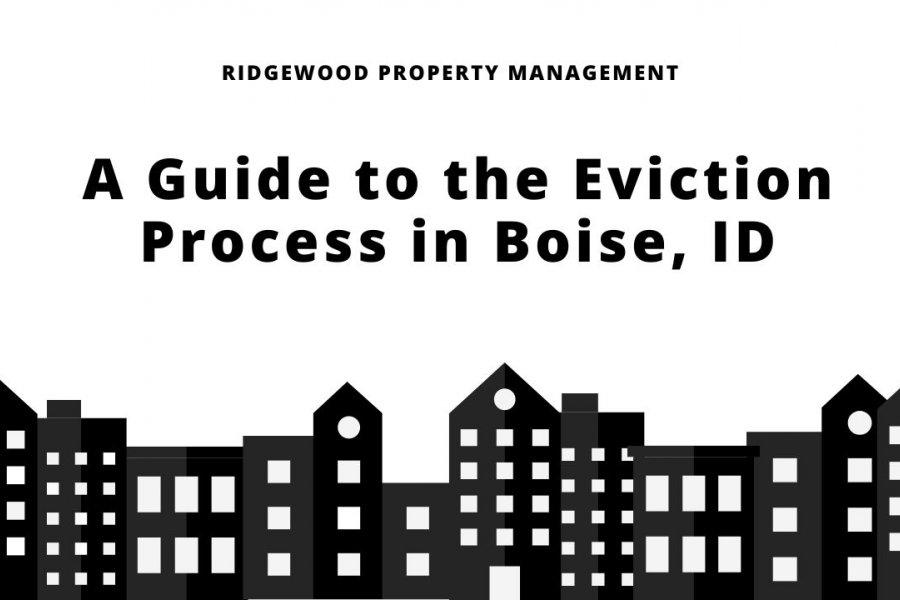
Idaho landlords can evict their tenant if they violate any of the terms of the rental agreement. The reasons for this violation range from if the tenant doesn't pay rent or engages in illegal drug activity in the rental unit.
Normally, the Idaho eviction process takes anywhere between one week and two months. But It can take much longer if your tenant requests a continuance.
If landlords fail to abide by Idaho law, this can result in an eviction lawsuit. An eviction lawsuit can be costly and time consuming for landlords, between hiring an attorney and court costs, so it's important to be familiar with the process.
So, evicting an Idaho tenant legally though the landlord-tenant laws isn’t as easy as it seems. It is a very involved process, and the state of Idaho requires landlords to follow its judicial eviction process to the letter.
Which is why we at Ridgewood Property Management have put together the following overview of the Idaho eviction process.
Eviction Notice
To serve an written notice, or eviction notice, you must first have a legitimate reason for evicting your Idaho tenant from your rental unit. Common reasons include:
- Idaho tenant not paying rent for the rental unit
- Idaho tenant wrongfully withholding payment
- Violation of the rental agreement
- Failure by the tenant to leave the rental unit when their rental lease is up
- If a tenant leaves waste on the rental unit
- Tenant failing to complete payment for substantial damage
- If a tenant engages in illegal activity in the rental unit
Once you have such grounds, you can proceed with the eviction process as follows.
Serve a 3-Day Notice to Pay
According to the state law in Idaho, rent becomes late a day after it falls due. So, in this case you would serve the tenant with a written notice of 3-Day Notice to Pay to encourage them to pay rent. The notice gives the tenant 3 days to pay the rent due or else move out.

If the tenant doesn’t pay the rent due or moves out within the 3 days, you may proceed with the eviction action.
Serve a 3-Day Notice to Comply
Serve to a tenant who commits a curable lease agreement violation. Examples of such lease agreement violations include having too many people residing in the Idaho rental unit, causing excessive damage, or violating a rental policy.
3-Day Notice to Quit
For incurable lease violations in Idaho, you can serve the tenant a 3-Day Notice to Quit. But unlike the other notice, this one doesn’t give the tenant an opportunity to cure the issue. The Idaho tenant must leave within the 3 days or else get evicted.
Serve a 30-Day Notice to Quit
A holdover is a tenant who does not leave after their tenancy has ended. So, if you wish them to leave then you would serve them with a 30-day Notice to Quit. The same notice also applies to Idaho tenants without a lease.
If the tenant refuses to leave within the 30-day period, you can begin the eviction proceedings against them.
Serve a 3-Day Notice for Illegal Activity
Illegal drug activity includes things like use of a controlled substance, production of a controlled substance, or unlawful distribution of a controlled substance. If the Idaho tenant remains at the rental after the expiry of the notice period, you may continue with the eviction process.

Summons & Complaint
At the next step of the eviction process, you must file a complaint in a relevant court – usually the District Court. The filing process will cost you between $166 and $221.
The service must be done in one of the following ways, by a person over the age of 18:
- Give a copy to the tenant in person or have an attorney give the copy.
- Post a copy in a conspicuous place on the premises and send another by certified mail.
- Leave a copy with any other occupant who is at least 18 years of age.
Unlike some other states, Idaho laws don’t specify how quickly the summons must be served to a tenant. The only exception are evictions involving squatters. In such evictions, the summons and complaint must be served on the tenant at least 24 hours prior to the hearing.
Court Hearing & Judgment
The date of the hearing depends on the type of eviction hearing or eviction lawsuit. For evictions involving nonpayment of rent or illegal drug activity, the hearing must occur 12 days after successful filing with the court.
For evictions involving squatters, the eviction hearing must be held within 72 days of the date the filing was done.
If the tenant wishes to attend the hearing, they will need to file an answer. The only exceptions are for evictions involving nonpayment of rent, illegal drug activity, and removal of a squatter.

If the tenant does not file an answer with the court within 21 days, the court may issue a default judgment in favor of the landlord. The same would also be the case if the tenant fails to attend the court hearing.
However, if the tenant chooses to file an answer, they may put up defenses such as:
- The rental unit doesn’t meet the requisite health, safety and structural codes.
- The nonpayment of rent was due to the landlord not upholding the rental agreement.
- The eviction was in retaliatory to the tenant exercising any of their rights.
- The eviction was based on a protected class under the Idaho Fair Housing Act, such as race, color, nationality, religion, or familial status.
- The reason for the eviction was exaggerated.
Writ of Restitution
The court will issue you a writ of restitution after a successful judgment. The court issues it 5 days after an eviction judgment is made. This is the tenant’s final notice to leave.
After you deliver it to a sheriff or constable, the eviction may even occur immediately. In Idaho, a writ of restitution doesn’t give a tenant any grace period to leave their rented premises.
Bottom Line
At Ridgewood Property Management we are an experienced property management company that you can trust. We can help find great tenants who will pay rent and are responsible.
We can help you get the most out of your rental investment. Get in touch with our team to learn more about our full suite of property management services.
Disclaimer: This blog should not be used as a substitute for legal advice from a licensed attorney in your state. Laws change, and this post might not be updated at the time of your reading. Please contact us for any questions you have in regard to this content or any other aspect of your property management needs.
